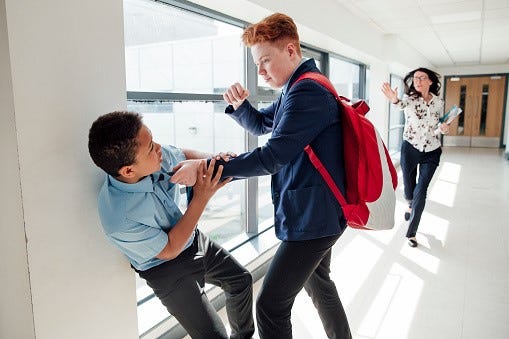The Way it Was
Growing up, we had respect for our teachers. Even if we didn’t like them, we knew they could report our bad behavior to our parents. The phrase “Wait till your father gets home,” still resonates. My parents were quick to set up an appointment with the principal if I didn’t get good grades, or, as happened at times, I got a misconduct grade on my report card. (I was very easily bored, which explains most of it—I wasn’t a bully). Friends at Catholic schools told us stories of “the nuns,” who could pretty much discipline kids any way they wanted to.
By high school, my district had a school for troublemakers, Gompers High School. You didn’t get sent there for a one-time offense; you had to be highly disruptive, interfering with everyone else’s ability to learn. Gompers was pretty hard-core and kids either learned to mind, or ended up eventually in juvie or worse. But they weren’t our problem.
Today
The California legislature is now voting on CA Bill 274, which will attempt to ensure that all elementary and high school kids who threaten teachers, bully kids, act out or do any number of other harmful activities be allowed to stay in class instead of being suspended. “Restorative justice” sometimes applies, a concept that sounds more like encouragement to make a pretense of apology as a way to get back faster to bullying everyone. Much like the many Blue state initiatives to decriminalize all kinds of criminal behavior and let perps walk while awaiting trial, the results are not surprising. More kids are getting into trouble as their crimes are worse.
We almost never saw anyone challenge or threaten a teacher. Now, I wonder how we keep educators around, as they struggle to get kids to learn. Classes are made up of good kids and smart kids, as well as English-language learners and social-promoted kids who can’t read, write or do math. Included are some who don’t obey any standards of behavior. “Welcome to the Jungle,” is a good title for many schools.
I get why suspension is bad. The kid punished this way loses out on more education, even as they need that help even more than more gifted kids. But here’s the thing. Do we allow one bad apple destroy the learning experience of everyone else in the class? Is that fair? The new bill is slanted towards those who never learned discipline, manners or correct behavior at home, while abandoning everyone else. It talks about trying to understand why children are “triggered,” and then get into dialogue to de-escalate the situation. But that takes valuable classroom time. It’s interesting that our major teachers’ union is taking no position on this bill.
What Works Better
It is good for all of us in a society to ensure that every child is educated, at least to a point. But you cannot allow bad behavior to disrupt everyone else’s opportunity.
Alternatives to consider that could be adapted to the needs of individual school districts include:
- Tracking – we had this in our junior high school. Ability grouping by subject meant that we had pretty large classes of students who were working at or above grade level, kids who did not need a ton of individual attention. Lower tracks had small class sizes and much more attention. Students can petition to move up as they catch up, and any given student might be in one track for a subject and another for a different one. Tracking was phased out because too many minorities found themselves in the lower tracks, BUT, they had the chance to catch up and be at grade level at the end of the year.
- Alternative punishments – one reason kids get behind is that they don’t have good support at home, not even time to do homework. Gather them in an after school “detention” where they focus on homework with a teacher (or volunteer), there to answer questions.
- Zero tolerance – a kid who acts out is asked one time to stop misbehaving. If they don’t, they are sent to the detention class for an hour. I’d also suggest that in grammar school, they stand in the corner for 15 minutes, just like so many of us did at home.
- Have school counselors who can focus on giving some support to kids whose parents are failing to provide it.
- Ensure that there is a school for the hard-core, so they can be moved away from other students if their behavior doesn’t improve.
The key point is that while every student should have a chance to learn, no student should interfere with another student’s chance to learn. When schools are tough on students, most fall in line with the program, as they did when I was younger. This discipline is essential for their future life. The work world isn’t going to tolerate it, so we have to stop it while the child is young and hopefully influenceable. If we don’t, we’ll be forever dealing with increasingly violent people who think that the law can touch them.
Life is tough for many students, but that isn’t an excuse for bad behavior.




